When James Neesham Avenged the 2019 ODI World Cup Heartbreak Against England in the 2021 T20 World Cup Semifinals
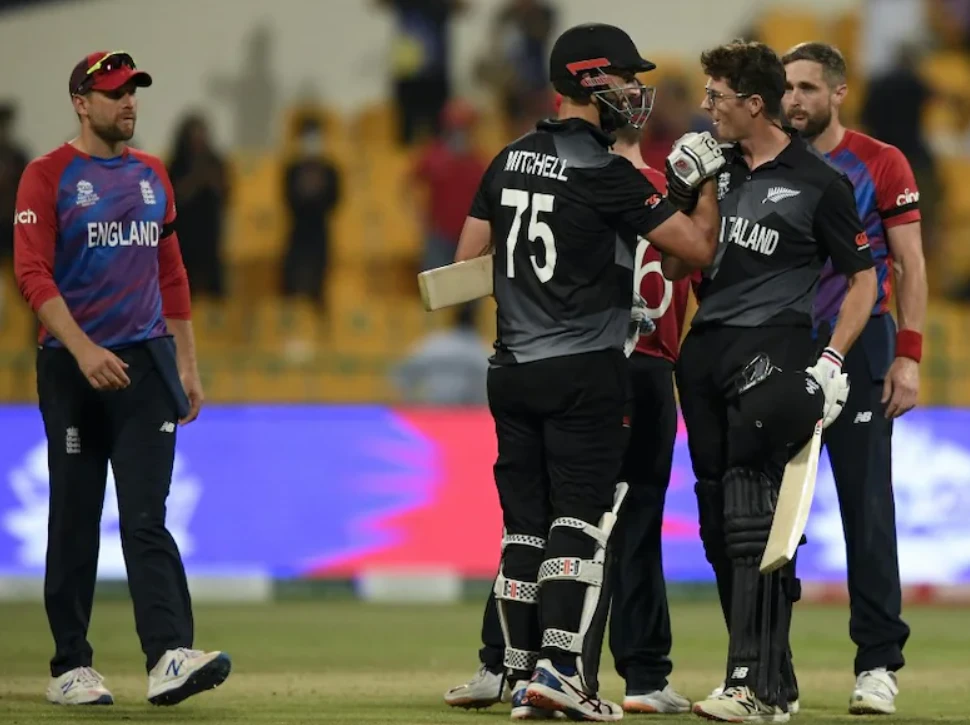
“England have won the World Cup by the barest of margins; by the barest of all margins. Absolute ecstasy for England, agony for New Zealand…”. These iconic words by Ian Smith from the 2019 ODI World Cup final still echo in cricket history. But for New Zealand, the pain lingered until they found redemption in the 2021 T20 World Cup Semi-Finals. It was a perfect story of revenge, where the Kiwis executed their game flawlessly to defeat England and rewrite the script of heartbreak. So, how did New Zealand turn the tables that night? Let’s revisit the thrilling encounter to relive the drama and triumph.
England vs New Zealand: 10th November 2021
It was the night of November 10, 2021, when England clashed with New Zealand in the first Semi-Final of the 2021 T20 World Cup. Held at the Zayed Cricket Stadium in Abu Dhabi, the atmosphere was electric as fans eagerly anticipated which team would progress to the final. England entered the match undefeated in the group stage with five wins, while New Zealand had secured four victories out of five games, setting the stage for a gripping contest. New Zealand opted to bowl first, winning the toss, and leveraging the pitch conditions that favoured chasing teams.
England’s reliable opening pair, Jonny Bairstow and Jos Buttler began confidently, taking on Tim Southee and Trent Boult. By the end of five overs, England had raced to 37/0. However, Kane Williamson’s decision to introduce Adam Milne into the attack changed the momentum. Milne struck with pace, dismissing Bairstow for 13 off 17 balls, giving New Zealand their first breakthrough. Dawid Malan joined Buttler at the crease, but the partnership didn’t last long. In the eighth over, Ish Sodhi trapped Buttler LBW for 29 off 24 balls, leaving England at 53/2 in 8.1 overs.
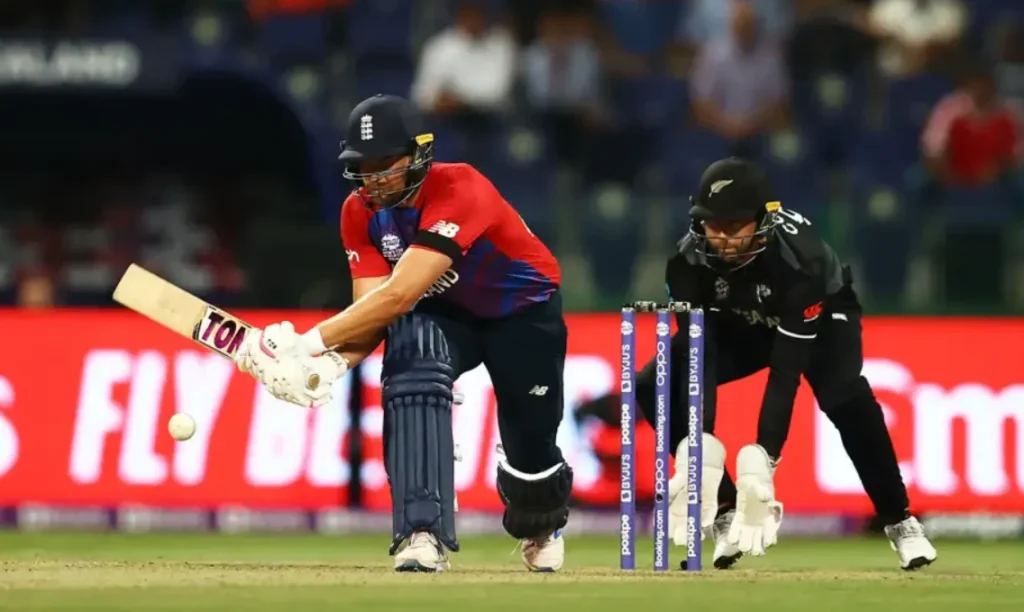
With the run rate slowing and pressure mounting, England needed stability in the middle order. Moeen Ali was promoted up the order to partner with Malan, aiming to rebuild the innings and set a competitive target. The tactical bowling changes by Williamson and New Zealand’s discipline in the field had put England on the back foot, setting the stage for a thrilling contest between bat and ball. Both Moeen Ali and Dawid Malan continued to build on England’s innings, forming a crucial 63-run partnership. Malan, who had been anchoring the innings, fell victim to Tim Southee’s precision in the 16th over, scoring 41 off 30 balls. With his dismissal, England found themselves at 119/3 with just four overs left, needing a late flourish to set a formidable target.
Enter Liam Livingstone, the big hitter brought in to accelerate the scoring. Livingstone wasted no time, smashing a quick-fire 17 off 10 balls, providing the much-needed impetus. However, his dismissal in the final over left England needing a strong finish to reach a competitive total. Moeen Ali, who had been anchoring from the other end, rose to the occasion. He smashed a boundary in the last over, bringing up his half-century off 36 balls. England eventually posted 166/4 in their 20 overs, giving themselves a fighting chance.
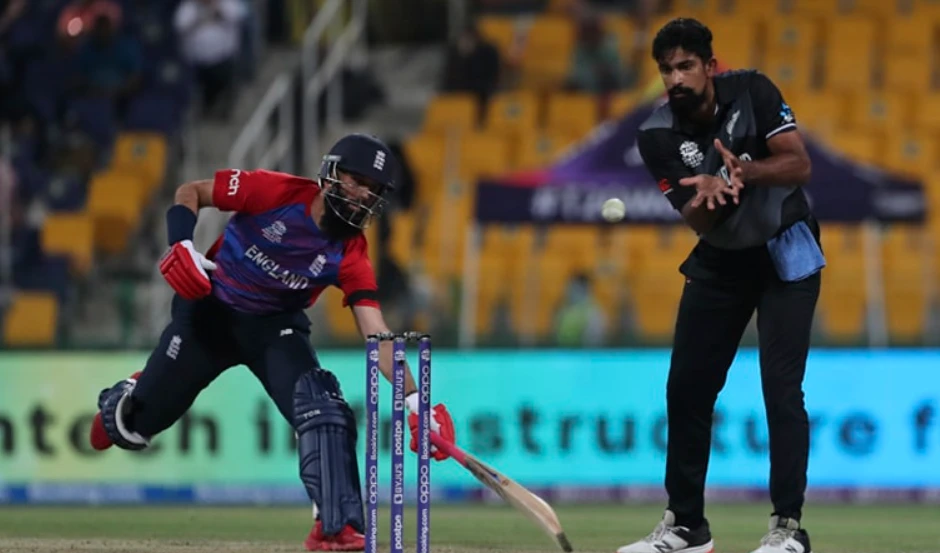
For New Zealand, the target seemed achievable, especially with the dew factor in play. Martin Guptill and Daryl Mitchell opened the chase, with Guptill smashing a boundary off the very first ball to signal his intent. However, Chris Woakes struck back almost immediately, dismissing Guptill for just 4 runs with a sharp catch by Moeen Ali. The pressure mounted as captain Kane Williamson walked in to stabilize the innings. But Woakes wasn’t done yet as he struck again in the third over, dismissing Williamson for just 5 off 11 balls. With New Zealand reeling at 13/2, the early setbacks put the onus on the middle order to mount a comeback against a disciplined English attack.
Devon Conway and Daryl Mitchell steadied the New Zealand innings with a calculated approach, focusing on singles and doubles while finding occasional boundaries to keep the scoreboard moving. By the end of the powerplay, New Zealand was at 36/2, still needing 131 runs from 14 overs. While Conway looked fluent and eased the pressure with his confident stroke play, Mitchell struggled to find his rhythm, adding to the mounting tension. As the innings progressed, Conway’s composure helped New Zealand inch closer to the target.
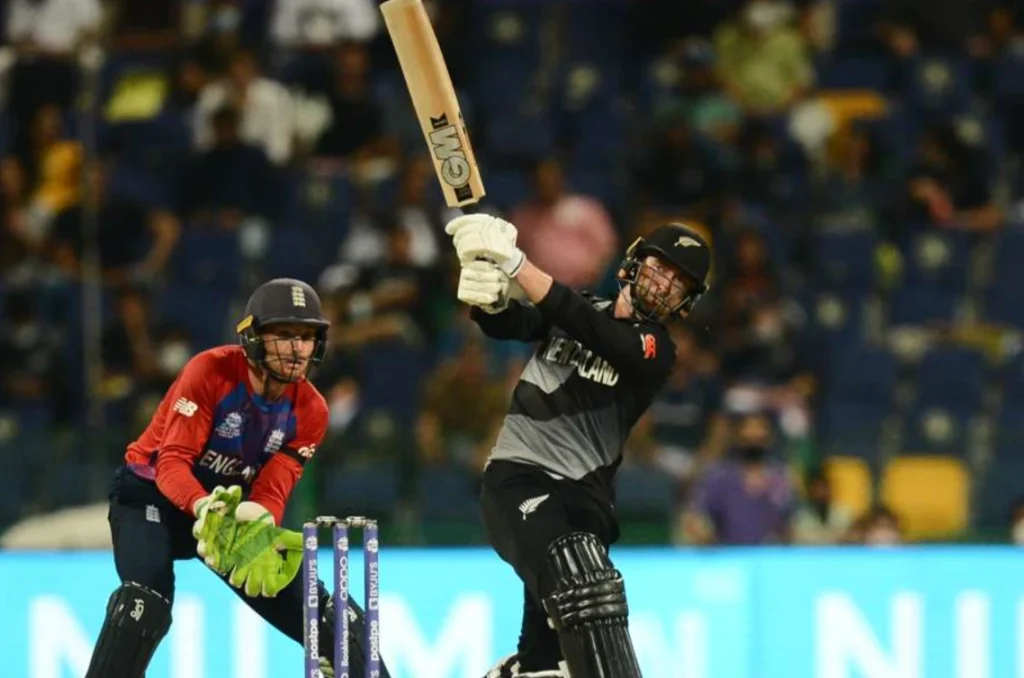
By the 13th over, the team had reached 92/2, with both batters settled at the crease and the likes of Glenn Phillips and James Neesham yet to come. However, just when it seemed New Zealand was gaining momentum, Eoin Morgan made a brilliant tactical move by reintroducing Liam Livingstone into the attack. The decision paid off instantly as Livingstone deceived Conway, getting him stumped for 46 off 38 balls, leaving New Zealand at 97/3 in 14 overs.
With 70 runs required from the final six overs, Glenn Phillips joined Mitchell in the middle. Unfortunately for New Zealand, Phillips couldn’t make an impact, departing for just 2 runs off 4 balls in the 16th over. The scoreboard now read 110/4, with 57 runs needed from the last four overs—a daunting task. As pressure mounted, New Zealand desperately needed a game-changing performance. Enter James Neesham, who walked in with a clear intent to take control of the chase and swing the momentum back in New Zealand’s favor.
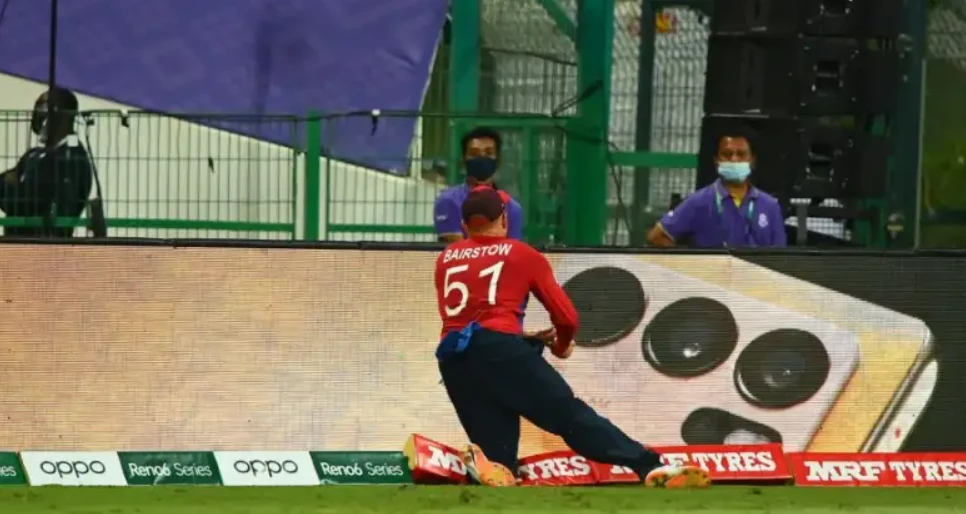
In the 17th over, James Neesham turned the tide of the match with a stunning display of power hitting. Facing Chris Jordan, Neesham smashed the first ball out of the park, igniting hope for New Zealand. Then came the moment reminiscent of the 2019 ODI World Cup Final: on the fourth ball, Jonny Bairstow attempted a catch at the boundary but inadvertently touched the rope with his knee. It was poetic irony, as destiny seemed to replay itself in favor of New Zealand. That fateful over yielded 23 runs, shifting the momentum decisively toward the Kiwis.
In the following over, Daryl Mitchell, who had been struggling earlier, finally found his rhythm. He reached his half-century off 41 balls, keeping New Zealand firmly in contention. However, just as things looked comfortable, Adil Rashid struck, dismissing Neesham for a blistering 27 off 11 balls. With New Zealand at 147/5, the equation stood at 20 runs needed from the final two overs. Eoin Morgan handed the ball to Chris Woakes, England’s standout bowler of the night, to stem the flow of runs.
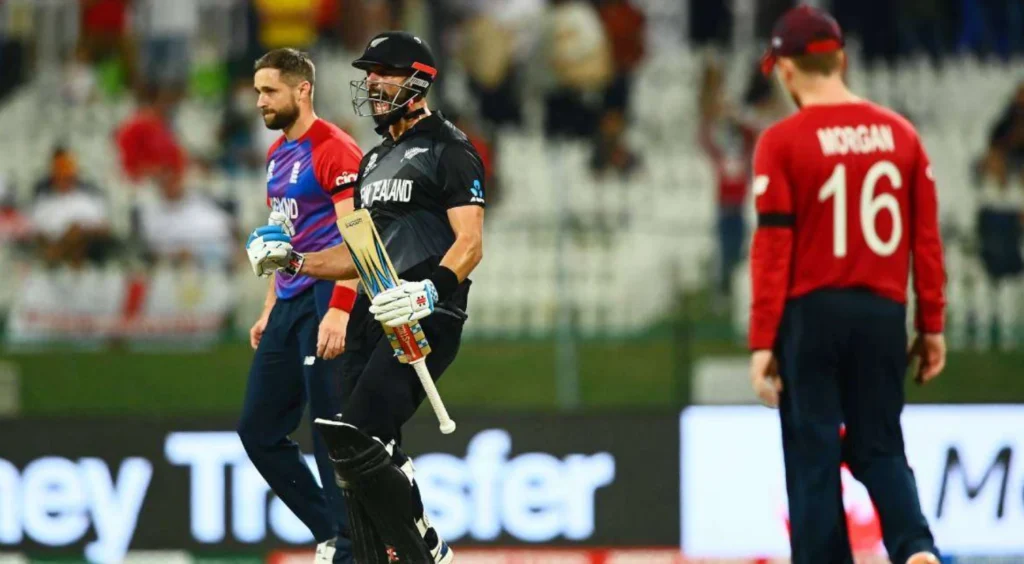
But Mitchell had other plans. On the second ball of the over, he launched a massive six, reducing the target to 12 runs from 10 balls. The very next delivery was dispatched over the boundary again, leaving the New Zealand dugout buzzing with excitement. With just 4 runs required from 7 balls, Mitchell finished the game in style. His shot raced through backward square leg for a boundary, sealing a memorable victory for New Zealand. The team erupted in celebration, having successfully avenged their 2019 heartbreak.
Daryl Mitchell was rightly awarded the Player of the Match for his unbeaten 72 off 47 balls. Despite early struggles, he showcased resilience and composure, leading his team to a historic win and securing their spot in the T20 World Cup Final.
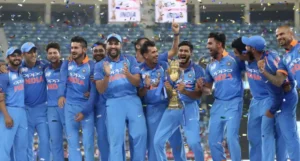
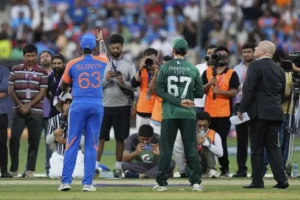

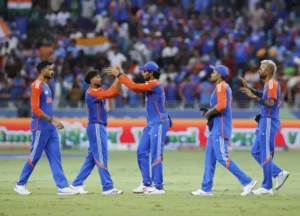

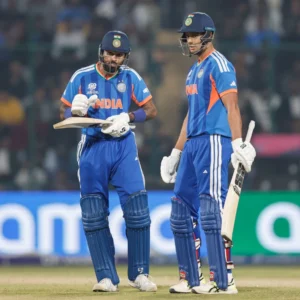
Comments